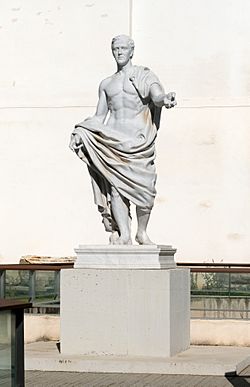Marcus Claudius Marcellus (consul 166 BC) facts for kids
Marcus Claudius Marcellus was an important Roman leader who lived a long time ago. He was a Roman consul three times: in 166 BC, 155 BC, and 152 BC. A consul was like a top elected official in ancient Rome, similar to a president or prime minister today. They were very powerful and helped lead the Roman Republic.
Contents
His Family Background
Marcus Claudius Marcellus came from a famous Roman family. His father was also named Marcus Claudius Marcellus, and he was a "censor" in 189 BC. A censor was a Roman official who kept track of citizens and their property. His grandfather, also named Marcus Claudius Marcellus, was even more famous, serving as consul five times!
His Life as a Roman Leader
Early Roles
In 169 BC, Marcus Claudius Marcellus worked as a "praetor." A praetor was another important Roman official, often acting as a judge or a military commander. He was sent to govern parts of Spain, which was a Roman province at the time.
Military Victories and Triumphs
In 155 BC, Marcellus led Roman armies to victory against a group of people called the Apuani. After this success, he was honored with a Roman triumph. A triumph was a huge parade in Rome where the victorious general and his army marched through the city, showing off their spoils of war. It was a very special event for a Roman commander.
Working for Peace in Spain
In 152 BC, Marcellus became consul for the third time. He was sent to Spain to take over command of the Roman army fighting against the Celtiberians. These were tribes living in central Spain.
When Marcellus arrived, he brought more soldiers. He managed to get one city, Ocilis, to surrender peacefully. He also defeated another group, the Nergobriges. Soon, other Celtiberian tribes like the Arevaci, Belli, and Titthi wanted to make peace with Rome.
Marcellus sent messengers to the Roman Senate in Rome, asking them to accept the peace offer. He believed it was time to end the long war in Spain. However, the Senate said no. They decided to send a new army to Spain the next year with a new consul, Lucius Licinius Lucullus.
Making Peace Happen
Even though the Senate refused, Marcellus was determined to make peace before Lucullus arrived. But then, the Arevaci attacked the city of Nergobriga, breaking the truce they had made with Marcellus.
In response, the Romans marched to attack the Arevaci capital, Numantia. Before the big fight started, the Numantines again asked for peace. Their leader, Litenno, met with Marcellus and offered to make peace for all the tribes.
Marcellus was very happy and accepted their offer. The tribes gave Rome hostages (people held as a guarantee) and money to show they would keep their promise. This way, Marcellus successfully ended the war in Spain before the new general, Lucullus, even got there!
Founding a City
Marcus Claudius Marcellus is also remembered for founding the city of Corduba, which is known today as Córdoba, Spain. He established this city in 169 BC, during his time as praetor in Spain.
See also
 In Spanish: Marco Claudio Marcelo (cónsul 166 a. C.) para niños
In Spanish: Marco Claudio Marcelo (cónsul 166 a. C.) para niños
 | Leon Lynch |
 | Milton P. Webster |
 | Ferdinand Smith |


